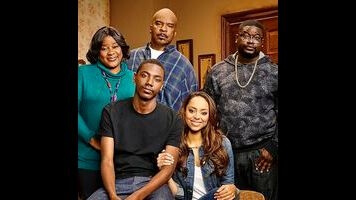The Carmichael Show tries to laugh with Bill Cosby, and at him, and not at all

Jerrod Carmichael isn’t the first comedian to aim for a head-on collision with the righteous furor over Bill Cosby. After all, it was a Hannibal Buress joke that lit the tinderbox that spread into a full-blown backlash in which Cosby went from America’s most wholesome comedy icon to a sleazy old rapist in what now seems like a matter of minutes. Of course it hasn’t been a matter of minutes. It’s been months and years and decades since the allegations against Bill Cosby began adding up until the sheer volume of accusers was enough to dilute all Cosby’s money, influence, and goodwill. The Carmichael Show’s “Fallen Heroes” practically qualifies as a late hit, now that the court of public opinion has rendered its verdict and moved on. And yet it feels fresh and transgressive because of Carmichael’s willingness to examine different perspectives without judgment.
Wisely, The Carmichael Show doesn’t waste much time debating Cosby’s guilt or innocence, which would be a minefield from which little good—or humor—could come. Instead, Carmichael plays with the more fraught and more interesting question of whether it’s still okay to enjoy Cosby’s comedy assuming he is guilty. It’s a question with a complex answer, one the show doesn’t go out of its way to answer explicitly. So many elements factor into someone’s decision to extend or withdraw their support for Cosby or continue to patronize his comedy. As I noted in my first-person account of attending a Bill Cosby show last year, for black people of a certain age, there are some valid cultural reasons to avoid jumping to conclusions when a black man is accused of raping (mostly) white women. There’s also a deeper emotional connection to Cosby for older people. To watch The Cosby Show as a child and to watch it grow into a phenomenon as an adult are two very different experiences. Especially when, as Bobby explains, Cosby has spoken in less than glowing terms about young black men in his many respectability harangues.
Even correcting for generational gaps, there are levels to this shit. Watching Cosby Show re-runs is arguably different than going to see Cosby live, as Jerrod wants to do with Maxine as some kind of ill-conceived romantic surprise. But one could argue one is just as bad as the other. Cosby doesn’t really make money from streaming, while he does make money from ticket sales, but there’s a straight line between many of the allegations against him and the time he spend doing The Cosby Show. Some of the assaults happened during Cosby’s “mentoring“ sessions during which he allegedly sedated women in order to have sex with them against their will. Is it appropriate to laugh at The Cosby Show knowing that Cosby may well have been raping women in his dressing room while everyone looked the other way? The conundrum of separating the art from the artist is always complicated, and lots of reasonable people arrive at totally different destinations despite taking the same roads.
Carmichael, who wrote the episode alongside Mike Scully, recognizes this, and makes no attempt to answer the question definitively. Like Cynthia and her stolen coat, each person has to determine whether they can stomach the fruit of a poisonous tree. The lesson falls hardest on Jerrod, who idolized Cosby as a kid, and still thinks so highly of him, he thinks surprising his girlfriend with tickets to see a soon-to-be 79-year-old comedian counts as a romantic surprise. (Note to Jerrod: This isn’t an adequate romantic surprise even if the elderly comedian in question didn’t probably rape several generations of women.) He and Joe don’t end up attending Cosby’s show, notably because Joe objects to “the principle” of pay $35 for parking. The family ends up back at Joe and Cynthia’s house trying to decide which episode of Cosby to watch on the new Apple TV before settling on Seinfeld, which comes with its own set of issues.
“The Funeral” makes an interesting pairing for “Fallen Heroes,” as it deals with similar questions of how to honor someone’s legacy while continuing to disavow their worst mistakes. It’s a more complex question when the complicated man isn’t just like family, he actually is family. Joe’s father dies, leaving him the unenviable task of trying to decide if and how to eulogize a man who he mostly knew as a horrible, abusive tyrant. It’s an interesting Carmichael episode in that it doesn’t strive to depict a uniquely black experience, it explores a universal experience through the lens of these particular characters. “The Funeral” goes to some unexpectedly dramatic places, and David Alan Grier does a marvelous job adding some depth and pathos to his character. As does Jerrod in “Fallen Heroes,” Joe accepts that it isn’t always possible to accept the whole of a person. You have to salvage what you can from the wreckage and try to be happy with it.
Stray observations
- Loretta Devine’s “Ave Maria” tag, with some chunks of Elton John’s “Rocket Man” tossed in, is just marvelous.
- Nekeisha’s back! And just in time for the Cosby debate. Her total ignorance of the situation is pretty amazing, as well as her attempt to scroll down through Cosby’s Wikipedia page to figure out what all the fuss is about.
- Cynthia delivers the most dangerous joke of the night, informing Joe that his decision to go to the Cosby gig instead of celebrating his anniversary with Cynthia makes her number 56 on the list of women Cosby has hurt. That joke is a seriously hot potato.